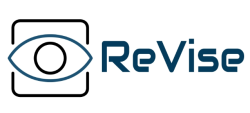
ReVise
Co-designing and evaluating a real-world implementation model for remote consultation with vision self-testing
Research summary
This research aims to develop a scalable, inclusive, and sustainable model for remote ophthalmic consultations integrating vision self-testing through the DigiVis app. With over 9 million NHS eye clinic appointments annually and demand projected to rise by 20% in the next decade, delays often lead to avoidable blindness, particularly among ethnic minorities, older people, and those in poverty. While remote consultations can reduce clinic pressures and enhance accessibility, only 5% of specialist eye consultations are currently remote, compared to the NHS target of 30%. By enabling accurate home-based visual acuity (VA) testing, DigiVis addresses key barriers such as the lack of reliable remote VA assessments and limited access to technology.
The study uses mixed methods at three NHS sites—Cambridge, Peterborough, and Manchester—and includes online surveys (100+ patients/parents and 100+ staff) and focus groups (24 participants from each group) to identify implementation challenges and evaluate outcomes over 14 months. Primary objectives include assessing changes in perceived attributes of the intervention, implementation barriers, and staff attitudes before and after implementation. Secondary objectives focus on analyzing demographic differences and patient-level CO2 savings. Outcomes are measured using validated tools such as the Perceived Attributes of e-Health Innovations Tool, the NoMAD tool, and the PERCS-NASSS framework, with additional analyses of waiting times and clinic throughput informing cost-effectiveness.
The intervention is expected to benefit over 22,000 patients during the study, with scalability to reach up to 3 million patients annually. Findings will be disseminated through NHS platforms, academic publications, and conferences to promote adoption of DigiVis and similar tools, improving NHS services and extending eyecare access to underserved populations globally.
Main inclusion criteria
- Any patient who has been allocated to have a follow-up remote consultation with VA self-testing by their clinician following a F2F consultation.
- Any NHS staff members working in or managing eye clinics in the four implementation sites.
Main exclusion criteria
- Patients who refuse the intervention
- Patients whose condition requires F2F either due to high risk or need for other tests
- Patients unable to access the technology
- Patients with complex psychosocial issues, safeguarding concerns or cognitive impairment
Patients with VA worse than +0.8 logMAR
Funders and sponsors
Funders: NIHR
Sponsor: Cambridge University Hospitals NHS Foundation Trust
Chief investigator
Miss Louise Allen
Contact details
Clinical Trials Coordinator: Paula Turnbull
Email: [email protected]






